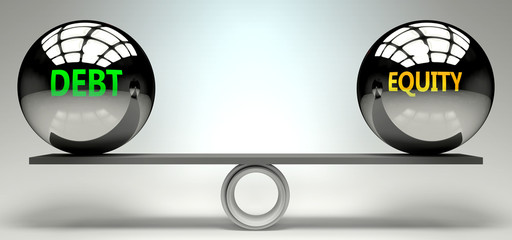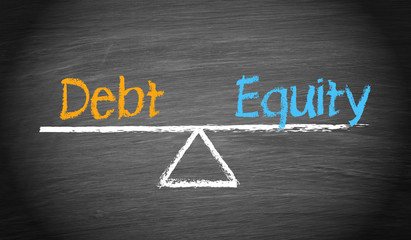
This article is about two broad types of investment – Equity and Debt. We will try to answer the questions like – What is the difference between Equity and Debt? Debt is better or Equity is better for you? Debt has high risk or Equity is riskier?
You would have heard that- so and so investment is of Debt type or sometimes your advisor would have told you that – It is better to invest in Equity at this time as the markets are favourable. However, before going ahead, you always wanted to understand the basic difference between Equity and Debt. Here are all the details you wanted to know.
Lets begin with the literal meaning of the words Debt and Equity.
Debt means liability or loan.
Equity means partnership.
Generally speaking, there are only two types of investment alternatives: Debt and Equity. Technically all investment products fall under these 2 categories. Hence we can say that you are either investing in Equity or in Debt.
What is Debt investment?
In the last blog we all have understood what is ‘Rent on Money’.
To further understand the concept of Interest click here –
What decides the ‘Rate of Interest’ in your investment?
Whenever Money is given (lent) to someone, the lender charges the interest on the amount lent. The borrower pays the interest and repays the principle. So whenever a fixed amount is lent for a fixed period with a fixed rate of interest the product can be considered to be Debt.
All of us have invested in Debt type of investment at some point in time. Here are a few examples of Debt – Bank Fixed Deposit (FD), Savings Account, PPF, National Savings Certificate are all examples of Debt investment. In all these examples you, as an investor, are a lender and the bank or post office or the Government is borrower.
Housing Loan, Vehicle Loan are also types of Debt instruments. However, in this case banks are lenders and we all are borrowers.
Here are some of the characteristics of Debt investment instruments.
- Borrower has to pay back the money to lender within stipulated time period
- Borrower will pay fixed interest as per the terms and conditions
- Risk is limited in this type of investment as the terms are pre-decided
- Here the borrower has a liability and is bound to return the principle plus interest
What is an Equity Investment?
In case of an Equity investment the money is not lent, but it is permanently given to the receiver. We all know that whenever an amount is put in a business it is permanently invested and what you get back is just the profit. You will get your money back only in case you sell out that business. In case of an equity investment there is no concept of Borrower and Lender. Here the person giving the amount is an investor or equity holder or shareholder. And the person who is receiving the amount is a ‘business’ which utilizes the amount for expansion of the business.
Few common examples of Equity investment is buying of Shares or investing in Equity Oriented Mutual Funds. When you buy shares of a company you invest in the company. Once you invest, the receiver is not expected to pay back your money to you. He will keep it permanently. You are eligible to participate in the profits that the company makes where you have invested your money.
Here are some characteristics of Equity Investment:
- You will not receive guaranteed returns. But you will be receive profit from the company in the form of dividend
- You will not receive your principal back (you can sell your shares to someone to free up your principle)
- There is no fixed time limit for this investment
- Risk is usually considered to be higher than the Debt instruments
Comparison of Equity and Debt on important parameters:
While deciding upon an investment the most important factors we have to decide upon are –
Risk
Liquidity
Taxation
Returns
I will be coming up with a dedicated article on all these parameters, but in the meanwhile you can read this –
What is Risk Profiling and why is it important? – Time to know yours
Risks:
All of us are always exposed to some or the other risk and so is our investment. As a human being we are exposed to risk of accidents while travelling, risk of food poisoning while eating outside, risk of drowning while swimming and so on.
Our investments are also exposed to the risks such as-
Default risk or Credit Risk – The borrower, sometimes it can be your bank as well, will not return your money.
Debt investments are exposed to Default Risk in case the borrower does not repay your money. Equity investments are not exposed to Default risk
Interest Rate Risk – Risk that the interest rate will fall down.
As Debt investment depends upon the rate of returns, it is exposed to the interest rate risk. If the interest rate falls you may no longer earn good returns on your investment. However, since Equity investment has no concept of Interest, it does not face such a risk. I am sure by now you know that Equity investments earn profits.
Volatility Risk – The share market prices will fluctuate is volatility risk.
Volatility risk is (usually) associated with Equity investment. Your Equity investment is done through Shares. So whenever, the share market prices move up and down you are exposed to volatility risk. In debt since the Rate of Interest is fixed, this risk is not there.
Inflation Risk – The value of your money keeps going down as the inflation increases.
This risk is associated with Debt and Equity both. As the value of money goes down due to increasing prices of goods and services, you need to ensure that you earn returns better than the inflation rate.
Liquidity:
Liquidity is the facility of taking out our investment whenever you require your money back.
Usually Equity investment is considered to be highly liquid. You can withdraw your money at any point in time from the Shares or the Equity Mutual Funds. However, the Debt investment may not always be as liquid as Equity investments. As is seen in case of an FD or PPF there is a Fixed lock-in period.
Taxation:
Taxation on any investment is the amount of Tax you will have to pay on returns of your investment. Once you pay tax on returns (returns are interest in case of Debt and profits in case of Equity) your net returns move down.
In India, Equity investments have better taxation than the Debt investments. More on this in later articles.
Returns:
Here, the Equity investment scores over the Debt investment. Though the Debt investment has fixed interest, they are lower as compared to Equity investments. Equity investment returns, though not fixed, usually are better than the Debt investments.
Duration:
As a general rule you will need to invest for a longer term in Equity investments (5 years and above) in case you wish to earn better returns. Debt investments can be for shorter duration as well as for longer duration.
Conclusion:
To finally decide upon whether you should invest in Debt or Equity you will have to assess your priorities on the parameters listed above.
So, as a general understanding, if you want to play safe and you are ok with lesser returns you can invest in Debt.
In case you wish to earn higher returns with some amount of risk you should invest in Equity.
You can put any questions you may have in the comment box below.
Get our blogs/articles delivered in your inbox. Click Here to subscribe.
